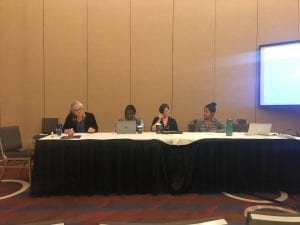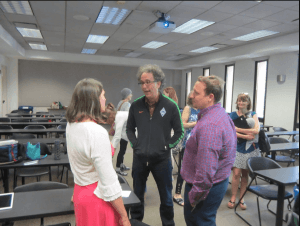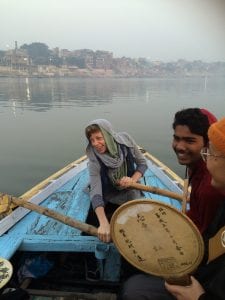This weekend, two faculty members from CofC’s German and Russian Studies department presented at the annual German Studies Association Conference in Pittsburgh. Dr. Nancy Nenno, Professor of German, gave a presentation entitled “Here to Stay: Black Austrian Studies” on the panel “Rethinking Black German Studies.” Dr. Sarah Koellner, Visiting Assistant Professor of German, presented a paper on Birgit Kempker, Maxim Biller, and Alban Nikolai Herbt in the three-day seminar “On the Very Concept of Autofiction: Theory and History” and was a respondent for the panel ““The (Socio)-Political Role of Football in 20th-Century German Film and Literature.”
Author Archives: campus
CofC German Faculty and Students attend SC-AATG fall workshop at USC
This Saturday, Sept. 22nd, CofC German program faculty Dr. Morgan Koerner and Dr. Sarah Koellner and incoming CofC adjunct instructor of German Stevie Laughead attended the annual workshop of the South Carolina chapter of the American Association of Teachers of German on the campus of the University of South Carolina. 30 participants attended the workshop and there were six presentations on different German teaching strategies, tools, and topics from K-16 German teachers throughout the state, followed by an open forum and planning session led by current SCAATG president Dr. Morgan Koerner.
One of the big takeaways of the workshop: there are great things with German happening in education in South Carolina, and we have a clear and strong need to get more German teachers into the system as programs grow and retiring colleagues need to be replaced! Here at CofC we are working hard to do our part and were elated that German and education double majors Denicee Becker ’20 and Lauren Smith ’22 made it up to the workshop as well!
The future is bright for German and education in the state of SC and we are grateful to all of the German teachers and teachers-in-training that are making it so! 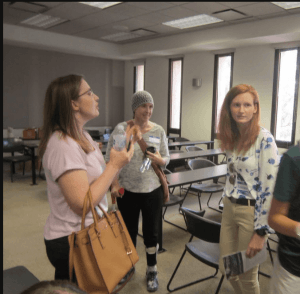
Russian Studies Alumna Deniz Houston interns at the World Cup in Russia
Where are they now? Capers Rumph ’09 (German and History)
When German and History double major Capers Rumph received the outstanding German student award in 2009, the German faculty noted that she was a “poster child for our mission at the school of Language Cultures and World Affairs: she studied a specific language and culture, German, but used that cultural encounter as a springboard to become a responsible and engaged world citizen.”
We caught up with her recently to hear what she has been doign since graduation, and were not in the least surprised that she continues to be an inspiring Paradebeispiel (paradigmatic example) of our misssion here in LCWA. Capers, we are so proud of and inspired by you!
What have you been doing since you graduated and what are you up to now?
Since graduating, I’ve had the privilege of working and/or traveling in 50 countries, sailing across the Atlantic, advocating for an end to the war in eastern DR Congo, managing an ethical textiles company in Ghana, learning to grow vegetables on a farm that is working to dismantle racism in the food system, photograph trips to Burma, India, Sri Lanka, and Japan with a group of radical peace activist Buddhist monks, and a handful of other interesting things.
Right now, I’m living in Portland, Oregon, balancing my time between farming, construction work, resisting the rise of fascism, and making art.
How did studying German in the School of Languages and World Affairs prepare you be a global citizen?
Studying German taught me how to learn a language. It was my first second language, and the experience laid the groundwork to add third and fourth (and hopefully more eventually!) languages to the mix. I think that being able to communicate with people across languages and cultures is an invaluable skill — and this being able to understand/converse with people has taught me to trust people and has fundamentally shaped one of my core beliefs that, “people are good”. This understanding, which for me came by way of “learning how to learn a language,” is essential to contributing to the de-escalation and redirection of the ignorance fueled polarization, fear mongering, and general slide into plutocratic fascism that marks this moment in history.
For more on Capers’ journey and her photography, see her website: www.theoppositeofwar.com
German program alumna Dona Totova Lacayo featured in CofC magazine
Dona Totova Lacayo ’05, the chief commercial and public affairs officer at the Port of Hueneme (wy-NEEM-ee) in California, minored in German along with her major in International Business at CofC and enjoyed courses with Herr Della Lana and Dr. Baginski during her studies. She is featured in this summer’s edition of CofC’s magazine (see below) and we followed up with her to ask what role German has played in her many career successes.
Her response: “The German minor at the College of Charleston has given me the confidence and ability to use the language on business trips to Germany and while working with clients and business partners that also use the language. Knowing the German language has been extremely helpful throughout my career, connecting with people is key to continued collaboration and great business relationships.”
Congratulations on all of your successes Dona, and we look forward to following your career as it arcs ever upward!
CofC Magazine interviews Dr. Irina Erman, Director of Russian Studies
German and English Major Jake Keim interns at German newspaper (and receives a very sweet first assignment!)
This summer, German and English double major Jake Keim ’19 is interning in journalism at the Frankfurter Neue Presse in Frankfurt am Main as part of the CofC Cultural Vistas Summer Internship in Germany program. His first assignment was a sweet one: a review of the Cereal Culture Cafe in Bornheim. Read Jake’s entertaining narrative of his 5-course sugar bomb experience in German and in English below!
We let our American intern try the new Cereal Café in Frankfurt-Bornheim
German as an advantage in medical school applications: Stuart Gilreath ’14 looks back
Does studying German and interning and Germany really help Science majors in their med school applications and careers? We recently caught up with CofC alum Stuart Gilreath ’14, currently a medical student at the University of South Carolina, to ask about his experience as a minor in German at CofC and intern at a hospital in Germany through our Cultural Vistas Summer Internship program.
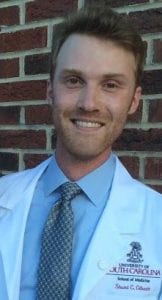
Stuart Gilreath ’14 (Biology and German, Honors College), currently in med school at the University of South Carolina.
“During the summer of 2012 I enrolled in the Cultural Vistas Summer Internship program alongside a handful of other students. This program provides a wide variety of internship opportunities. Members of my group were awarded internships in business, publishing, sports management, art management, chemistry, and healthcare. My internship took me to the Chirurgische Klinik und Poliklinik TU, München, where I shadowed surgeons and medical students. Beyond simply shadowing, some of my other tasks included holding retractors during surgery and assisting with wound dressing (under supervision, of course).
Over the course of the summer my German skills improved significantly, and I was provided the opportunity to gain valuable hospital experience while living in Munich, a beautiful and navigable city with everything you expect in a German city: outstanding public transit, beautiful parks, excellent food, and great beer. As a bonus, this internship program looked great on my medical school applications. Almost every single one of my medical school interviews started with a question about my summer at a “hospital in…Germany??”
Studying German has benefited me academically and professionally. I found it to be a culturally enriching addition to an otherwise primarily science-oriented education. All my professors were enthusiastic and supportive, and found entertaining ways to practice the language, such as composing character monologues to perform for the class or writing narrative papers. I would strongly encourage anyone interested in foreign language or experiences abroad to consider German!”
Sarah Dinning ’20 (Marketing and German, Honors College) interns in Communications at Mercedes-Benz Vans

Sarah Dinning represents Mercedes-Benz Vans at the job fair of the 2nd CofC German-American Business Summit, February 8th, 2018
Only in her sophomore year, Marketing and German student Sarah Dinning has spent the spring and summer of 2018 interning in Communications at Mercedes-Benz Vans. But are Marketing and German really a good fit? Absolutely, says Sarah:
“When I started at the College, I decided to take German for my language requirement. Halfway through my first semester in German 101, I decided to become a German minor. I really wanted to pursue German but I was worried about how I would incorporate it into my other studies. As it turns out, Marketing and German are a fantastic combination. I landed an internship at Mercedes-Benz Vans, LLC, where I get to use and improve my German everyday while also improving my skillset in Marketing and Communications. It’s really the best of both worlds, because as a business major, people try to sway you away from pursuing a language by saying, “but what will you actually do with it?” but it has helped me immensely in my studies and in finding an internship. I’ve made a lot of really great connections by studying German, and I’m even planning on going to graduate school in Germany – something I never would have considered before. There are so many great German companies in South Carolina, and you are really setting yourself up for unique opportunities by choosing to study German.”
LCWA Advisory Board Member Adam Chubb on Exercise Science in Germany and his decade as a professional basketball player in the German Bundesliga
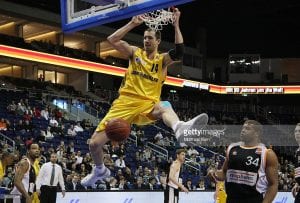
BERLIN – MARCH 25: Adam Chubb of Berlin in action during the Basketball Bundesliga match between Alba Berlin and Ratiopharm Ulm at the O2 World Arena on March 25, 2009 in Berlin, Germany. (Photo by Matthias Kern/Bongarts/Getty Images)
Thinking about what foreign language to combine with your Exercise Science or Athletic Training major? Former professional basketball player Adam Chub advises students to consider German! A member of the advisory board of CofC’s school of Languages, Cultures and World Affairs, Adam spent a decade playing in the German Bundesliga, for teams such as Alba Berlin, Gießen 46ers, and Eisbären Bremerhaven. During his career in Europe, he learned first hand why Germany is a world leader in the fields of exercise science and sports medicine. Read more about his experience and his role in CofC’s School of Languages, Cultures, and World Affairs in this Q&A.
Q: What led you to play professional basketball in Germany and what was it like to play there for a decade?
A. I accepted a job in Germany my second year out playing professional basketball. I originally went to Germany because I was offered a job, but stayed for 10 years because I loved the country, its people and culture. They had a great sports culture and basketball was an up and coming sport due to Dirk Nowitzki catching on fast in the NBA. The culture and atmosphere was similar to the United States so that helped me feel comfortable no matter what region of the country I played and lived in some small farm towns as well as big cities like Berlin. I was able to get a feel for the country and its people over my 10 years there.
Q: During your long career in Germany, you worked with a wide range of professionals in sports medicine, physiotherapy, and athletic training. How and why does Germany excel so much in these fields?
A. The German Sport University in a renowned university in Köln that was founded in 1947. With 6000 students, the university produces some of the top sports medicine professionals in the world. Germany also has a strong soccer culture and high-performing clubs that demand top doctors, trainers and physiotherapists to keep their athletes healthy. Even American athletes like Kobe Bryant and Alex Rodriguez have traveled to Germany to see German doctors and get treatment they can’t receive anywhere else in the world.
Q. You didn’t speak German before you made the move, but learned German on the ground and on the court. Why should students interested in careers in sports-related fields learn German?
A. Since Germany is known for its sports medicine, learning German would be beneficial to anyone interested in a sports-related field. With the globalization of sports and business today, speaking German would created great opportunities in the United States as well as overseas. It would give you top-level access to sports and medicine-related fields as well as education.
Q. After you ended your career, you moved to Charleston and recently joined the Advisory Board of CofC’s School of Languages, Cultures, and World Affairs. Why did you get involved with LCWA at the College and what do you hope to accomplish on the board?
A. I am hoping to be a resource for advice and guidance to the school and students through my international, cultural and business experiences in Europe. Being able help others reach their international business and education goals by sharing my experiences and connections is my ultimate goal.

